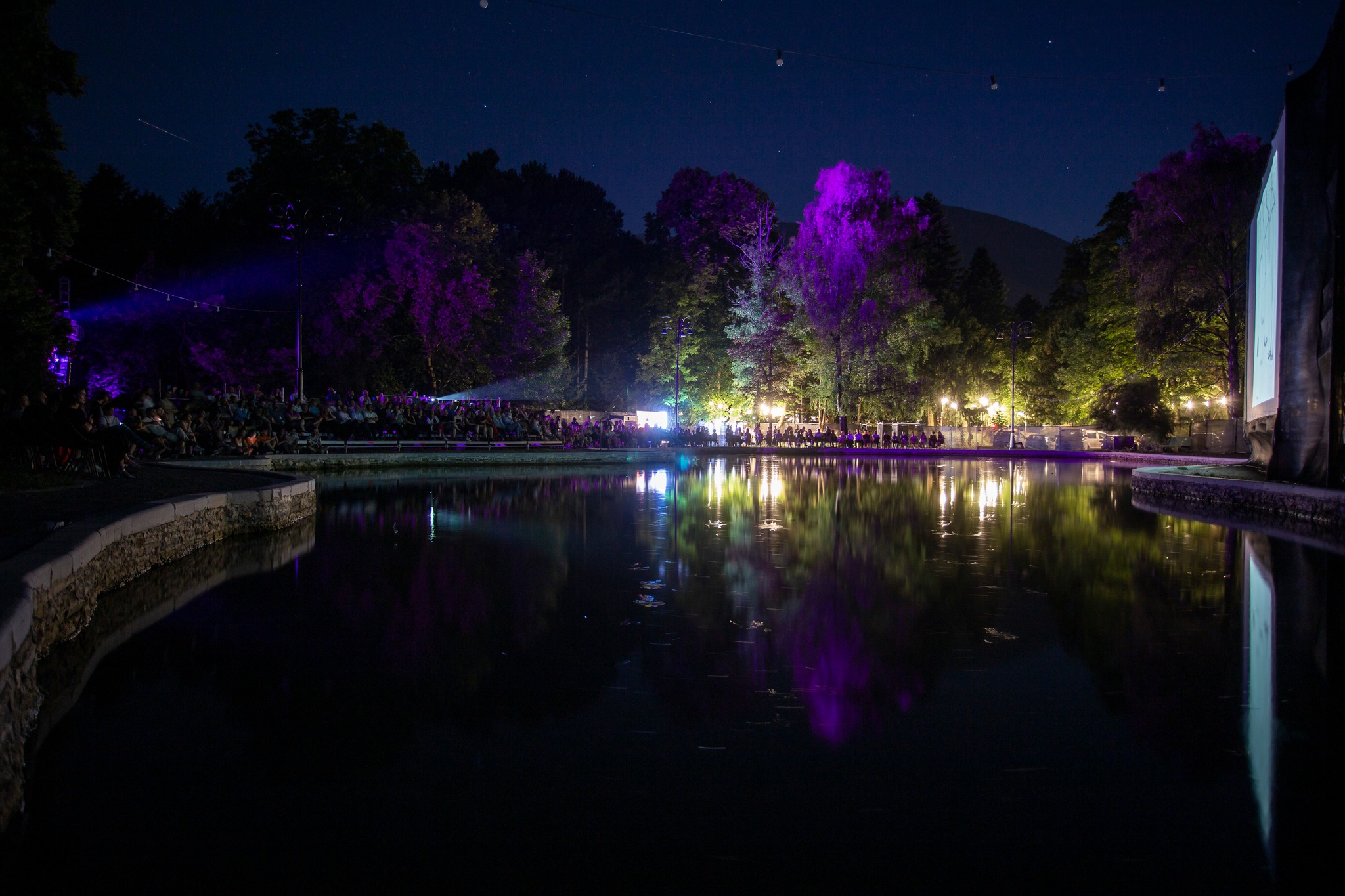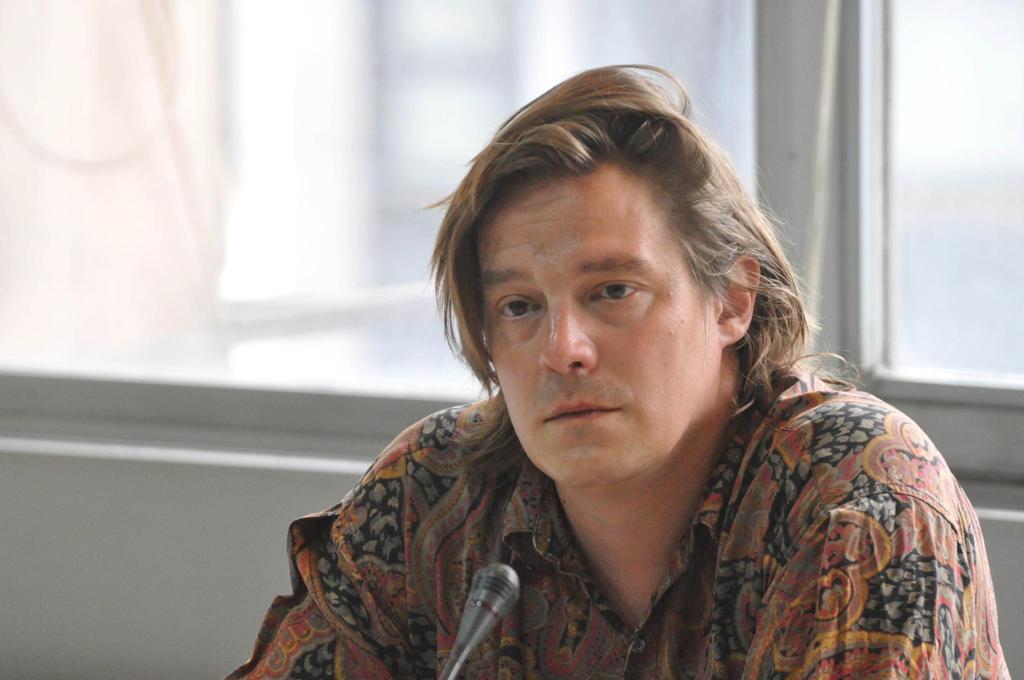
Ana Pinter, a theatre director from Belgrade, Serbia, identifies herself as an experimental artist. She is an active member of the Association of Independent Cultural Scene of Serbia (ICSS), a collaborative platform comprising over 80 organizations from 21 cities in the cultural and arts sectors of Serbia. Currently, Ana is visiting the city of Peja/Peć in Kosovo as a participant in the ANIBAR International Animated Film Festival. It is her inaugural visit to Kosovo and the city of Peja/Peć. “I am amazed by the vibrancy of this city and the delightful festival, which has chosen Love as its theme this year. I am excited to meet and engage in discussions with my colleagues from ANIBAR, exploring the foundations of potential collaborations,” says Ana.
“Therefore, we felt it was important to create an opportunity for young people from Kosovo and Serbia to collaborate in both formal and informal settings. Thus, we developed the project, applied for funding, received support, and now we have begun its implementation.”
Luka Knjezevic Strika, Association of Independent Cultural Scene of Serbia
Ana and other artists from the Association of Independent Cultural Scene of Serbia (ICSS) are visiting ANIBAR as part of the EU-funded project “Fostering Sustainable Partnerships and Dialogue: Arts and Culture Collaboration between Kosovo and Serbia.” This project is jointly implemented by ANIBAR and ICSS. Luka Knjezevic Strika, representing ICSS, explains that they have been collaborating with ANIBAR over the past two years within the broader regional context, focusing on developing international cultural cooperation and intersectoral collaboration in the field of culture in Serbia and Kosovo. Their aim is to establish new models of organization and partnership between the civic and public sectors.
While there have been some cooperative initiatives among cultural organizations in both entities, there remains a lack of sustainable and structured collaboration between organizations in Serbia and Kosovo. Additionally, there is not enough opportunities to develop different technical and soft skills within the sector in both countries, as well as limited opportunities for younger organizations and individuals to enter the sector, especially in Serbia, where there is very few opportunities to find jobs in the field of culture. Many young people in both countries lack the opportunity and structural support necessary to more actively engage their local communities. “Therefore, we felt it was important to create an opportunity for young people from Kosovo and Serbia to collaborate in both formal and informal settings, exchange experiences and knowledge. Thus, we developed the project, applied for funding, received support, and now we have begun its implementation,” explains Luka.
The project encompasses a range of activities designed to enhance the cultural sector’s capabilities and foster collaboration between independent artists, cultural spaces, and institutions in Kosovo and Serbia. These activities include equipping cultural spaces with necessary equipment, organizing cultural public programs and events, and facilitating the exchange of contemporary cultural and artistic programs. The project also involves convening network member assemblies, producing an independent culture magazine, publishing blog articles online to cover the independent culture scene, conducting workshops and training sessions for young artists, and supporting 24 collaborative arts exchanges and co-productions between Kosovo and Serbia.

“We also sought to explore and experiment with new modes of cultural cooperation between Kosovo and Serbia, learning from each other to enhance the understanding and possibilities to think of new ways of working and collaborating while sustaining the many activities already existing.”
Luka Knjezevic Strika, Association of Independent Cultural Scene of Serbia
Through these collaborative efforts, the partners aim to deepen their understanding of the differences and similarities between the cultural and societal contexts of Kosovo and Serbia. “We also sought to explore and experiment with new modes of cultural cooperation between Kosovo and Serbia, learning from each other to enhancethe understanding and possibilities to think of new ways of working and collaborating while sustaining the many activities already existing,” expresses Luka.
Cultural organizations and initiatives in the region have consistently taken the lead in promoting important cross-cutting issues such as human rights, gender equality, democracy, good governance, and environmental sustainability. Anibar and ICSS, in particular, have been instrumental in advocating for innovative models of civic public partnerships to govern public infrastructure. Through this project, the implementing organization will have the opportunity to forge partnerships and integrate these issues into cultural and artistic programs held at the cultural spaces.
About the project
The Fostering Sustainable Partnerships and Dialogue: Arts and Culture Collaboration between Kosovo and Serbia project is supported by the EU-funded “EU Civil Society Facility and Media Programme/Western Balkans and Turkey for 2021-2023 (IPA III)”. Launched in 2023, the project is scheduled to run for 48 months. Its overarching goal is to strengthen and cultivate sustainable, inclusive, and participatory contemporary cultural collaborative practices and structures between Serbia and Kosovo.
Photo credits: ANIBAR
Ana and other artists from the Association of Independent Cultural Scene of Serbia (ICSS) are visiting ANIBAR as part of the EU-funded project “Fostering Sustainable Partnerships and Dialogue: Arts and Culture Collaboration between Kosovo and Serbia.” This project is jointly implemented by ANIBAR and ICSS. Luka Knjezevic Strika, representing ICSS, explains that they have been collaborating with ANIBAR over the past two years within the broader regional context, focusing on developing international cultural cooperation and intersectoral collaboration in the field of culture in Serbia and Kosovo. Their aim is to establish new models of organization and partnership between the civic and public sectors.
While there have been some cooperative initiatives among cultural organizations in both entities, there remains a lack of sustainable and structured collaboration between organizations in Serbia and Kosovo. Additionally, there is not enough opportunities to develop different technical and soft skills within the sector in both countries, as well as limited opportunities for younger organizations and individuals to enter the sector, especially in Serbia, where there is very few opportunities to find jobs in the field of culture. Many young people in both countries lack the opportunity and structural support necessary to more actively engage their local communities. “Therefore, we felt it was important to create an opportunity for young people from Kosovo and Serbia to collaborate in both formal and informal settings, exchange experiences and knowledge. Thus, we developed the project, applied for funding, received support, and now we have begun its implementation,” explains Luka.
The project encompasses a range of activities designed to enhance the cultural sector’s capabilities and foster collaboration between independent artists, cultural spaces, and institutions in Kosovo and Serbia. These activities include equipping cultural spaces with necessary equipment, organizing cultural public programs and events, and facilitating the exchange of contemporary cultural and artistic programs. The project also involves convening network member assemblies, producing an independent culture magazine, publishing blog articles online to cover the independent culture scene, conducting workshops and training sessions for young artists, and supporting 24 collaborative arts exchanges and co-productions between Kosovo and Serbia.

Through these collaborative efforts, the partners aim to deepen their understanding of the differences and similarities between the cultural and societal contexts of Kosovo and Serbia. “We also sought to explore and experiment with new modes of cultural cooperation between Kosovo and Serbia, learning from each other to enhancethe understanding and possibilities to think of new ways of working and collaborating while sustaining the many activities already existing,” expresses Luka.
Cultural organizations and initiatives in the region have consistently taken the lead in promoting important cross-cutting issues such as human rights, gender equality, democracy, good governance, and environmental sustainability. Anibar and ICSS, in particular, have been instrumental in advocating for innovative models of civic public partnerships to govern public infrastructure. Through this project, the implementing organization will have the opportunity to forge partnerships and integrate these issues into cultural and artistic programs held at the cultural spaces.
About the project
The Fostering Sustainable Partnerships and Dialogue: Arts and Culture Collaboration between Kosovo and Serbia project is supported by the EU-funded “EU Civil Society Facility and Media Programme/Western Balkans and Turkey for 2021-2023 (IPA III)”. Launched in 2023, the project is scheduled to run for 48 months. Its overarching goal is to strengthen and cultivate sustainable, inclusive, and participatory contemporary cultural collaborative practices and structures between Serbia and Kosovo.
Photo credits: ANIBAR
Please wait while your video is being uploaded...
Don't close this window!